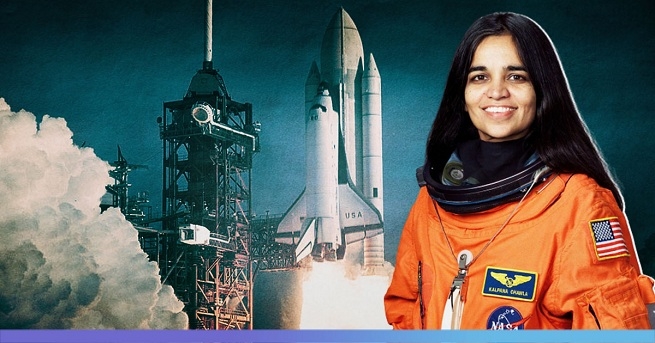NASA spacecraft named after Kalpana Chawla lifts off for ISS
| Date :04-Oct-2020 |

By Reena Bhardwaj :
WALLOPS ISLAND,
A COMMERCIAL cargo spacecraft bound for the International Space Station (ISS) launched on Friday night carrying the name of deceased NASA astronaut Kalpana “K C” Chawla, the first Indian-born woman to enter space, for her key contributions to human spaceflight. The S S Kalpana Chawla launched from the Mid-Atlantic Regional Spaceport (MARS) at NASA’s Wallops Flight Facility in Virginia at 09:38 pm. The spacecraft, a Northrop Grumman Cygnus, will arrive at and be attached to the space station two days later. On the NG-14 mission, the S S Kalpana Chawla will deliver approximately 3,630 kilograms of cargo to the station. When the Kalpana Chawla spacecraft lift off its launchpad atop a Northrop Grumman Antares rocket it marked a special moment for many, including Kalpana’s husband.
“I would say that Kalpana would be very flattered that this rocket is named after her,” Jean Pierre Harrison told ANI. In an interview he further added that the launch even had a larger context, “Indians can compete with the rest of the world to be successful.” While Chawla made the ultimate sacrifice in service to the space program, her legacy lives on. She has not only inspired her colleagues but also many back in India, to follow in her footsteps. Her final research conducted onboard Columbia helped understand astronaut health and safety during spaceflight. Robert Curbeam, Kalpana’s fellow astronaut friend and now the Vice President Business Development, Tactical Space Systems Division for Northrop Grumman spoke to ANI remembering Kalpana.
“She was an absolutely brilliant woman. And I am so proud to count her as a friend. I think the most important thing we learned from the Columbia disaster was that the hardware talks to you. And when things don’t act as they’re designed to act, you have to pay very very close attention because all the different pieces of the spacecraft interact with one another.” Northrop Grumman, an American global aerospace and defence technology company said that this mission is named after Chawla in memory of the mission specialist who died with her six crewmates aboard the space shuttle Columbia in 2003. Northrop Grumman stated that it is proud to celebrate the life of Kalpana Chawla and her dream of flying through the air and in space. “It is the company’s tradition to name each Cygnus after an individual who has played a pivotal role in human spaceflight,” said Northrop Grumman.
Born in Haryana, India, Chawla moved to the United States to earn her master’s and doctorate degrees in aerospace engineering from the University of Texas in 1984 and the University of Colorado in 1988, respectively. She then began her career at NASA, conducting research in fluid dynamics at the Ames Research Center in California. After becoming a naturalised US citizen, Chawla applied for and became a NASA astronaut as a member of “The Flying Escargot,” NASA’s 15th class of trainees. In 1997, she launched on STS-87, a 15-day shuttle mission that was dedicated to the science flying as part of the fourth United States Microgravity Payload (USMP-4).
Chawla’s second spaceflight, STS-107, came to a tragic end on February 1, 2003, following 16 days of conducting science onboard the space shuttle Columbia. A small piece of foam that struck the orbiter’s left wing during launch created a hole that went undetected during the mission. Upon Columbia’s return to Earth, hot plasma entered the wing, tearing it apart, and the resulting loss of control led to the vehicle disintegrating and the death of the crew.
